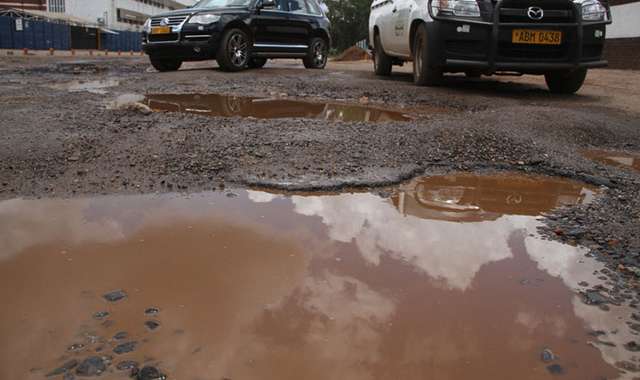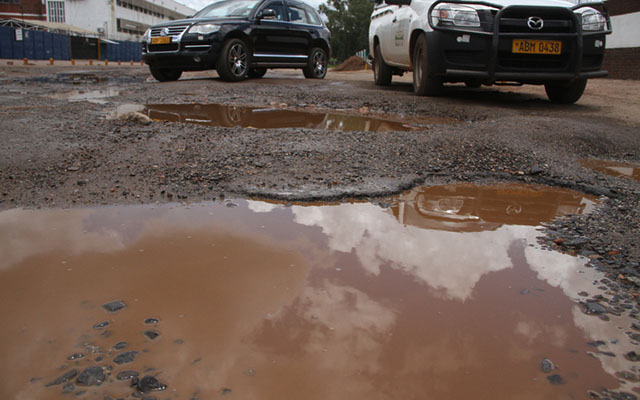Zim road rehab to chew $2,2bn


Motorists negotiate their way along a damaged Kelvin Road South in Graniteside, Harare. — (Picture by Justin Mutenda)
Lloyd Gumbo Senior Reporter
ZIMBABWE requires at least $2,2 billion to rehabilitate the national road network comprising approximately 17 000km of tarred roads and 71 000km of gravel roads, Transport and Infrastructural Development Minister, Dr Joram Gumbo has said.
The money covers rehabilitation costs for existing roads only, while construction of new roads and dilapidated ones would require at least $5 billion.
In written responses to The Herald, Dr Gumbo said his ministry had a rolling five-year plan for road development and rehabilitation that aimed at upgrading and rehabilitating the national road network.
“Almost the entire national road network has outlived its design life of 20 years, so the ministry faces a huge task in its programme,” he said.
“The national road network is approximately 17 000km of surfaced (tarred) roads and 71 000km of gravel roads. The amount required to rehabilitate the national road network is approximately $800 million for surfaced roads and $1,4 billion for gravel roads.
“These figures will be updated following conclusion of the national road condition survey that is currently underway.”
Dr Gumbo said his ministry was in the process of engaging financial institutions and development partners to reconstruct the network in public-private partnership (PPP) initiatives.
He said while some local authorities had genuine concerns about the money they received from the Zimbabwe National Roads Administration (Zinara), the parastatal did not collect enough to satisfy the needs of all local authorities.
“Some road works will be done under this approach, such as Build-Operate Transfer (BOT) models. The result of one such project is the Beitbridge to Chirundu Road being financed by Geiger International of Austria as a BOT project and whose implementation should start this year.
“Secondly, it is the intention of my ministry to improve revenue collection and management by Zinara, so that other road projects can be directly funded from the Zinara Road Fund.
“The resources that are currently being collected by Zinara are not sufficient to finance the rehabilitation of the national road network. The objective of the Zinara Road Fund was to collect road user charges and provide funding for road maintenance and rehabilitation.
“However, the amount of disbursements to road authorities is far lower than revenues collected by Zinara, which is the source of dissatisfaction of the local authorities. This is partly due to the heavy commitments that Zinara has as a result of the Plumtree-Mutare project, which unfortunately can no longer be changed.
“The ministry is continuously engaging Zinara to increase their efficiency in collecting and managing revenues and then subsequently increase disbursements to local authorities,” said Dr Gumbo.
He acknowledged concerns raised over the poor workmanship on some of the projects that have been carried out on the country’s roads by contractors especially the Plumtree-Harare-Mutare highway (Infralink project).
Dr Gumbo said he was also aware of the impact of haulage trucks on the road network adding mechanisms were in place to correct the situation by improving the railway network so that heavy cargo can be transported through railway networks.
“The Infralink project was not subject to approval by the Department of Roads. In future, all engineering work will be subject to inspection and approval by the Department of Roads to ensure good workmanship and quality and adherence to standards. Further, for big projects such as the Beitbridge-Harare-Chirundu project, independent engineering consultants will be hired to assist with supervision of the projects,” said Dr Gumbo.








Comments